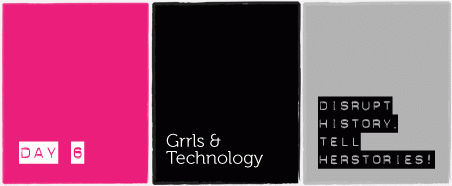
When you think of all the "legends" in the development of information and communications technologies (ICTs), you rarely hear the names of women. The usual names that spring to mind - some even complete with Hollywood movies and biopics - are people like Steve Jobs for being the innovative driving force behind Apple, Bill Gates for the ubiquitous presence of Microsoft, Richard Stallman for initiating the Free Software movement through the GNU project, and recently, Mark Zuckerberg , for being the "genius" behind the popular social networking website, Facebook.
Less familiar (unless you took a class in computer programming) are names like Ada Lovelace who was the first computer programmer in history for writing the first algorithm to be used specifically for computers, or Grace Hopper who invented the first computer language composed of words, or Betty Holberton, Kay McNulty, Marlyn Wescoff, Ruth Lichterman, Betty Jean Jennings and Fran Bilas for being the six women who were the original programmers of the first general-purpose computer, ENIAC.
This contributes to the idea that ICTs is the domain of men and boys as creators and innovators, and that women and girls are mainly just users and consumers. This in turn affects the choices that parents make in encouraging their children to study science and technology based on their gender, and the masculine culture that permeates the industry, making it hard for women and girls to enter as equal participants and decision-makers. What happens is a perpetuation of this cycle of gender stereotypes and myths that cast women as passive background actors in the development of ICTs and men as active groundbreakers - the stuff of legends.
Break out from history. Tell herstories!
Spotlight the innovative girls and women around you who are doing creative, inventive and groundbreaking things with technology. Counter mythologies with real stories of the barriers that women and girls face in taking up ICTs, or the revolutionary people who encouraged them to play and experiment with technology despite existing stereotypes. Make a tweetcast!
1. Recognise her ideas and contribution
- Think of local online projects and initiatives that you have taken part in recently. Do you know who are the people behind them? Get in touch and ask them if there are women and girls involved that you can spotlight as part of this actions.
- Or girl friends who would like to be computer programmers, software developers, video game creators etc. Ask them if you can interview them about their passion and plans.
- If you have women friends who are already in the industry, interview them and tell their story!
- If you are in school, or have cousins and siblings in school, get their thoughts on girls pursuing education in science and technology. What are the possibilities and challenges? What ideas do they have to make it better?
- Or interview your mom! Everyone makes herstory, every opinion counts :)
2. Prepare your questions
- Think of a list of questions to ask them. You can ask 1 question to many different people. Or 3-5 questions to identified individuals.
- Ask about their experience, ideas, barriers and aspirations. For example:
- "Tell me about the first time you learnt how to do something using computers. How did it make you feel?"
- "What inspired you to work with people on this great idea/decide on this ambition?"
- "Why do you think it's important for more girls to take up technology?"
- "What do you think are challenges for women and girls to study and make a career in ICTs?"
- "People always say that it's not that the opportunities are not there, but that girls are just not interested in science and maths. What do you think?"
3. Record the interview
- Use anything you have at hand to do audio recordings. For example, many mobile phones also come with a recording function. If you have a computer or laptop with a plugged-in or built-in mike, you can also use that to make audio recordings by using something like Vocaroo or Voisse.
- Get in touch with the person, let them know you plan to make an audio programme of their experience and opinions, and record the interview. Let them know how you plan to share this audio interview.
- If you don't have any recording equipment, type up responses afterwards or do a text-based interview through email.
4. Broadcast and share it!
- If you have a Twitter account, you can use Twaud.io to record or upload your audio recording, and broadcast it as a Tweet. Just login using your regular Twitter account, and select "record" or "upload".
- You can also upload it to this website, and share the link:
- Create an account on the site
- Select "Create content", then click "Audio"
- Fill in the title, location, and basic description of your audio clip.
- Upload the audio clip, and click "save"
- Or burn your interview in a CD and pass it along to your favourite hair salon, grocery shop or school bus driver and ask them to play it as part of the 16 Days campaign. Take it offline!
- If you have a text interview, blog it, email it to us and we'll publish it here, or leave it as a comment on this page.
Disrupt history. Start by herstories! Spotlight the everyday inspiration, challenges and ideas of the women and grrls around us who play with technology. And have fun :)
- Log in to post comments
